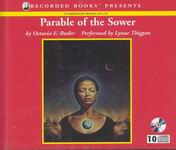
 Parable Of The Talents
Parable Of The Talents
By Octavia E. Butler; Read by Patricia Floyd, Sisi Johnson, and Peter Jay Fernandez
11 Cassettes – 16 Hours [UNABRIDGED]
Publisher: Recorded Books LLC
Published: 2001
ISBN: 0788749900
Themes: / Science fiction / Dystopia / Post-apocalyptic / Religion /
A good novel is not about one thing, but many. Octavia Butler’s jarring and beautiful Parable Of The Talents affirms this assertion. In terms of plot, it is the story of a religious sect preaching change and space travel; of how that sect develops an idyllic rural settlement in an economically gutted Northern California; of how a powerful group of Christian fanatics crush that settlement; and of how the leader of that sect survives to search for the children stolen in that attack and sew the seeds of her own growing religion. But it is also the story of a mother’s search for her daughter, of a man’s betrayal of his own flesh, and of a woman broken by furtive hostility and shattered trust. It is a story of hope in the face of implacable evil, of freedom amid slavery, perseverance through poverty, and love grappling with hate. It is a story of authentic people–husbands, wives, daughters, and friends–shredded by the power that be in an America gone mad.
What makes this book so terrifying is the plausibility of that madness. America implodes not from external forces such as war and disease, but from her own economic polarization and religious zealotry. Butler’s extrapolations are not wild hyperbole, but a subtle tweak on the headlines you will read in tomorrow’s paper. The effect will leave you awake at night when the rest of your family is blissfully asleep.
The voices that narrate this minor masterpiece are mostly amazing. Patricia Floyd’s portrayal of Lauren Olamina is warm and powerful. Her husband, as read by Peter Jay Fenandez sounds wise and loving, and his interpretation of her brother reveals both his humanity and the frozen center of his heart. The weakest voice is that of Olamina’s daughter, Larkin, whose childish breathiness doesn’t span the full emotional range of her character.
The text has its imperfections, as well. There is a point at which a freakish intervention of nature provides such a perfect solution to such an impossible predicament that my belief crumbled. And after spending so much effort explaining how the America of our experience is dead forever, it seems to revive just fine at the end, without a compellingly plausible cause. As serious as these issues sound, they leave intact a story that will still be shaping your thoughts months after you finish it.
I discovered after listening that this novel is the second in a series, but it stands so well on its own, you won’t have to hear Parable Of The Sower to appreciate it. However, if that book is as sensitive and unsettling as this one, it should be well worth your time.






